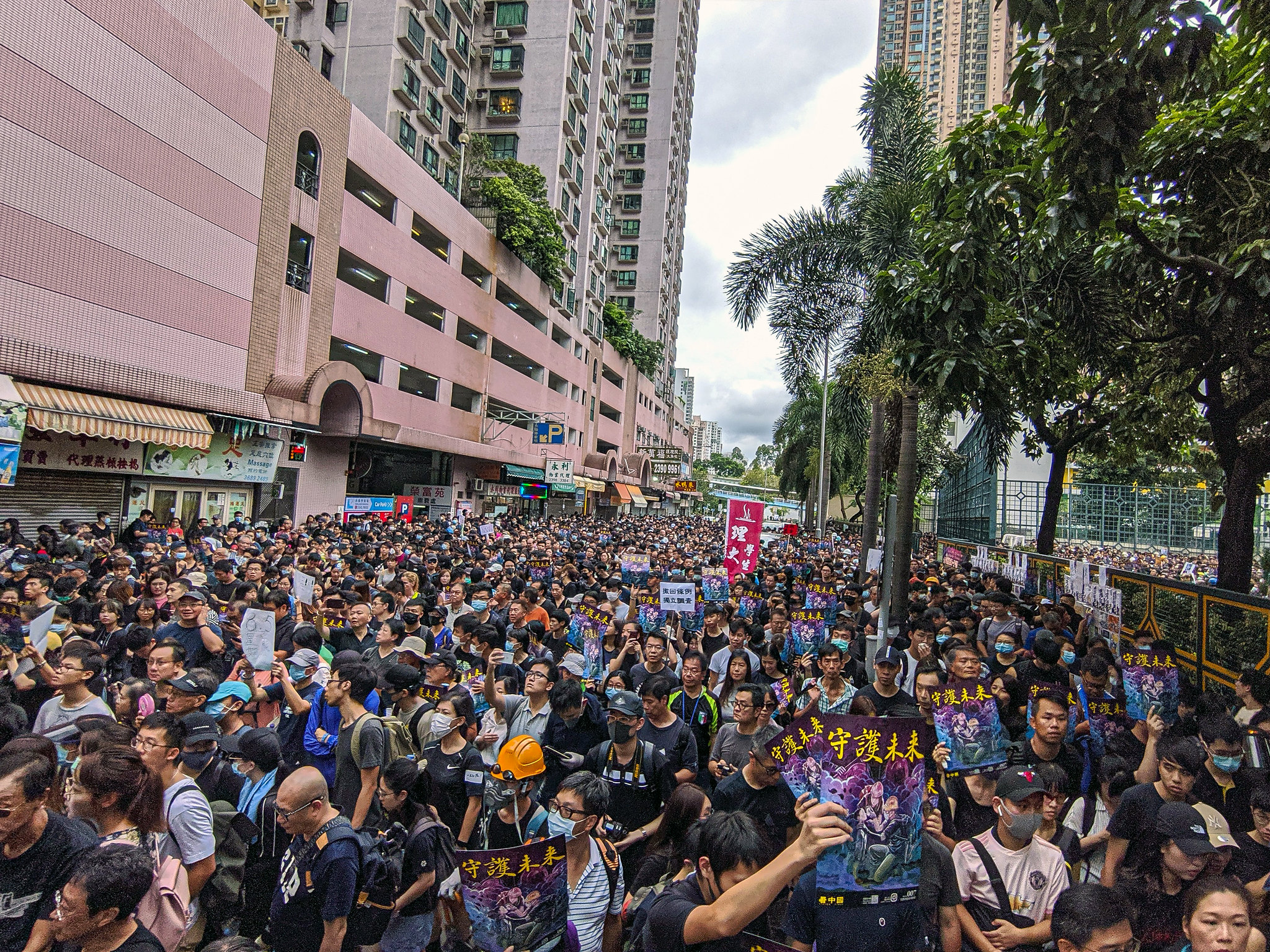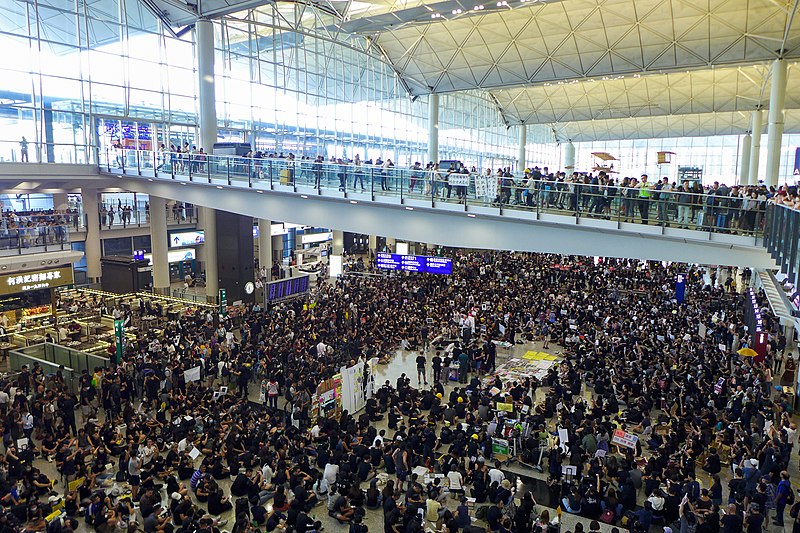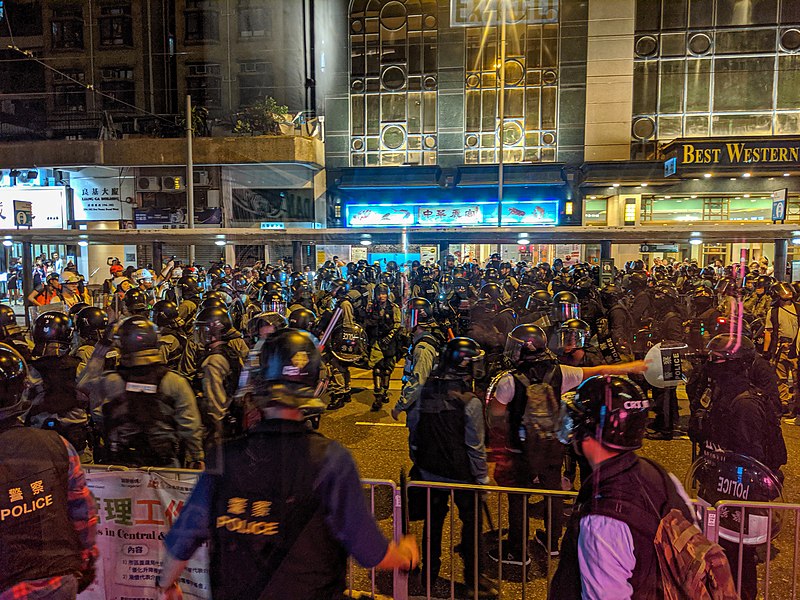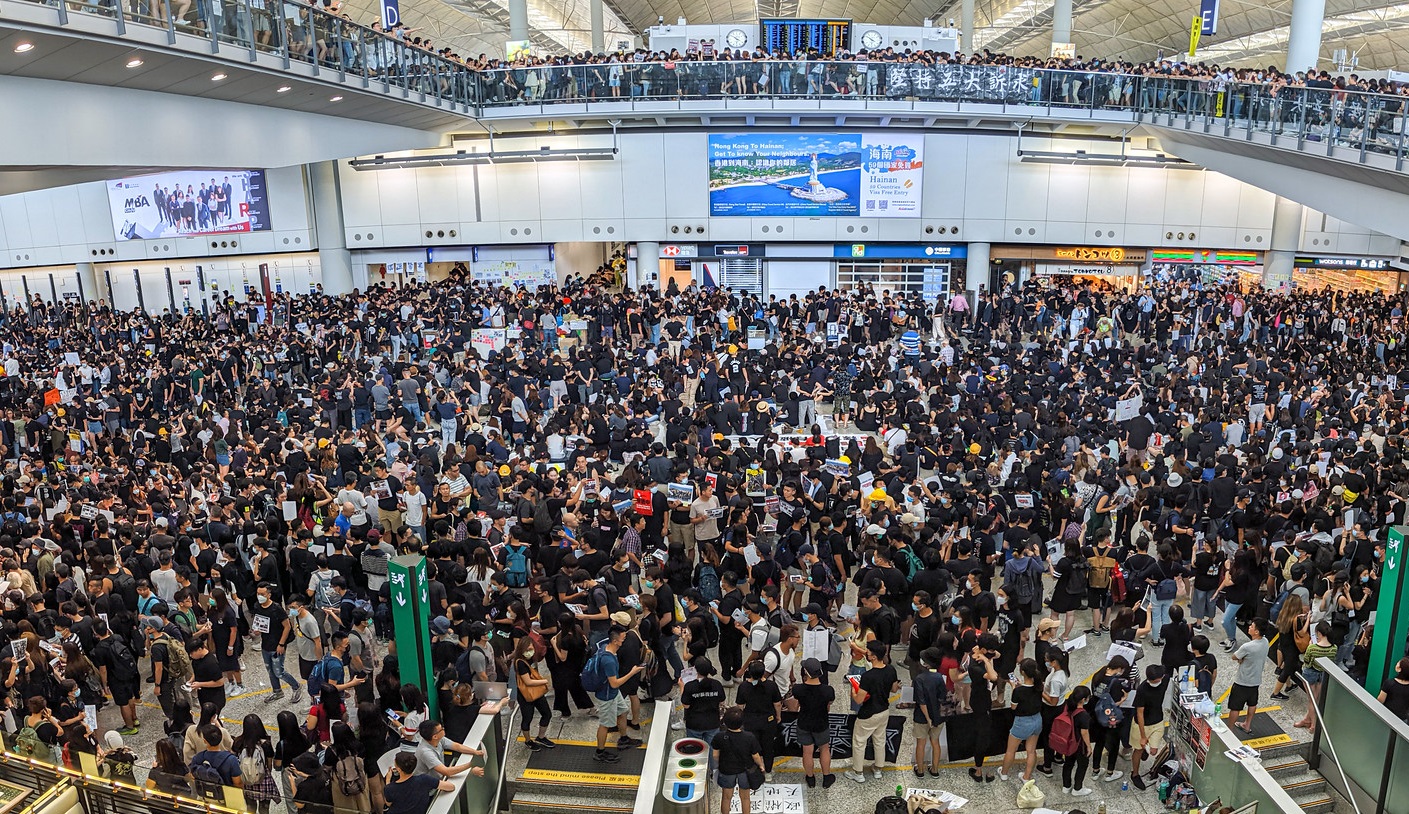Hong Kong’s earthshaking protest movement is entering its second month. Despite increasing pressure from Beijing and the Carrie Lam government, the movement still grows in militancy. It is graduating from bourgeois liberal methods towards the method of class struggle. In many ways, when Carrie Lam emerged from days of obscurity to respond to the general strike, she was right to say that the Hong Kong movement is heading towards a “path of no return.”
The Hong Kong masses are pressing ahead to overcome the acute social contradictions created by the capitalist system, despite the myriad of confusion introduced by all sorts of nefarious elements. Yet, without a Marxist political leadership, a class struggle perspective, and a socialist programme, the reactionary fetters introduced by bourgeois liberal and reformist leaders will become an absolute fetter to the advancement of the working-class interests of the Hong Kong masses as a whole.
On Monday, 5 August, the Hong Kong masses strived to make history, as a general strike was attempted. The last, fully realised general strike in the city took place in 1925 against the iron heel of British imperialism.
Historical developments and material circumstances, along with Stalinist and reformist betrayals, deprived generations of the Hong Kong working class from a fighting experience and organisation for a long period. In this early stage of grasping for a method and strategy, the current movement, unfortunately, found themselves in a dangerous and disorientating confluence with pro-western imperialist public figures’ slogans, perspectives, and interests.
The course of the struggle up to this point highlights the urgent necessity for a sharp class differentiation to take place.
The historical circumstances that surrounded the 5 August general strike
Western imperialist powers’ historical pace of development afforded their ruling classes the time, vitality, and foresight to craft a system of bourgeois dictatorship, that gave them a wide range of tools to safeguard their status. This accumulated into the system of bourgeois democracy, with many slight variations, but all ultimately ensuring the absolute sanctity of private property, the nation-state and “rule of law” in order to maintain the free market and capitalist accumulation, based on the exploitation of the working class.
The institutions of bourgeois democracy provide the ruling class with a useful barometer of the mood of the masses, allowing them to gauge their room for manoeuvre. As Engels explained in the Origins of Family, Private Property, and the State:
“As long as the oppressed class – in our case, therefore, the proletariat – is not yet ripe for its self-liberation, so long will it, in its majority, recognize the existing order of society as the only possible one and remain politically the tail of the capitalist class, its extreme left-wing. But in the measure in which it matures towards its self-emancipation, in the same measure, it constitutes itself as its own party and votes for its own representatives, not those of the capitalists. Universal suffrage is thus the gauge of the maturity of the working class.”
 On Monday, 5 August, the Hong Kong masses strived to make history, as a general strike was attempted. The masses must continue down the road of class struggle or face defeat / Image: Flickr, Studio Incendo
On Monday, 5 August, the Hong Kong masses strived to make history, as a general strike was attempted. The masses must continue down the road of class struggle or face defeat / Image: Flickr, Studio Incendo
Democratic rights are exactly what the Beijing regime opts to avoid. The regime is desperately trying to clamp down on any attempt at independent, working-class organisation. For the CCP bureaucracy as a whole, in order to prevent a Chinese working-class revolution, or its own evisceration by adversarial western imperialist forces, it can only ensure its own survival by instituting capitalist counterrevolution on its own terms, without providing any bourgeois-democratic rights to the working class.
This is the basis of not only the CCP regime’s rule over Hong Kong, but more importantly that of the local capitalist class. The latter plays a significant role in China’s overall capitalist economy and provided the initial injection of capital into China that led to the dismantling of the planned economy and restoration of capitalism. The “One Country, Two Systems” regime in Hong Kong is chiefly concerned with maintaining the Hong Kong capitalist class’ dictatorship over the city, as well as the Chinese market’s access to western finance capital. For the Beijing bureaucracy, granting any further democratic concessions to Hong Kong’s masses was never in question, as it would harm its necessary dictatorship over the Chinese working class as a whole.
Understanding the above perspectives is of life-and-death importance for the Hong Kong working class as they enter into any form of struggle. Any fight for genuinely democratic and economic gains necessarily raises the need for class-based methods, and to spread the fight into mainland China.
The winding road to the 5 August strike
The liberal public figures of the present movement have no such understanding, but they enjoy a great deal of attention and coverage in the bourgeois media. Even worse, the reformist labour leadership, purportedly “anti-establishment” (in Hong Kong this means “anti-Beijing”) sought to negotiate a tactic that satisfies both the rule of law set by Beijing and the Hong Kong capitalist class, and the interests of western imperialism. They reflect the fact that the Hong Kong bourgeois have common interests with the Chinese bourgeois in maintaining the ruthless exploitation of the workers of Hong Kong and the mainland.
In the initial eruption of the present movement in early June, which necessarily had a spontaneous nature, the call for a general strike was already present. It was strengthened in influence by Carrie Lam’s outright refusal to back down in the face of millions-strong peaceful demonstrations in June. To date, even prior to the 5 August strikes, the Hong Kong masses already dealt tangible blows to the bosses. According to the Financial Times, private sector business activities of the city already dropped to their lowest point since the last global financial crisis.
In the face of such a strong call for class struggle, rather than seriously organising a general strike, the liberal Civil Human Rights Front twice endorsed and later repealed the call for one. The Hong Kong Confederation of Trade Unions (HKCTU), under the leadership of Carol Ng, priding themselves as the “genuine union leadership” against the Beijing-controlled Hong Kong Federation of Trade Unions (HKFTU), chose to repeatedly characterise the general strike as a “mass day-off”, i.e. the workers needed permission from their employers in order to strike. This is the same explanation that the HKCTU offered the working class in the run-up to the 5 August attempt at a general strike.
At the end of the 5 August strike, Carol Ng said that 35,000 workers joined the strike, which she claimed was one-third of her members. Yet the HKCTU’s membership, as of 2017, appears to be 140,000. While not insignificant, the HKCTU failed to mobilise the great majority of its forces. To turn this around, it needs to not only convince more unionised and unorganised workers to join, but go on to form a mass party of the working class with a fighting socialist programme, clearly opposed to capitalism and the bosses, and willing to struggle outside of the bounds of laws set by the CCP and Hong Kong capitalists.
Suicidal perspectives of the liberals
The more liberal, petty-bourgeois student figures such as Joshua Wong, the Demosisto party’s most famous cofounder, have been playing an even more destructive role, repeatedly calling for US, European, and Japanese intervention. This is in spite of Trump openly characterising the Hong Kong movement as “riots,” likely to momentarily placate China in the present trade war. Wong furthermore openly thanked Democrat House Speaker Nancy Pelosi for her statement endorsing the “Hong Kong Human Rights and Democracy Act” sponsored by Chris Smith (R-NJ), who is an anti-abortion, anti-LGBTQ, imperialist reactionary.
In the June storming of the Legislative Council building, where the British colonial flag was flown, Wong claimed that it was a desperate measure because “we’ve tried everything.” How flying the colonial flag would help is anyone’s guess. Did they expect the British imperialists to send in the navy to protect democratic rights in Hong Kong? As Trump’s statements show, the rights of the people of Hong Kong are only small change in the struggle between imperialist powers. In addition, they had not “tried everything”. They had made no serious attempt to mobilise the working class. It was before the general strike was even attempted.
The experience of the 5 August strike
 The Hong Kong international airport has become a battlefield in the present struggle. Since the mass work stoppage there on 5 August, many protesters have staged occupations / Image: Wpcpey
The Hong Kong international airport has become a battlefield in the present struggle. Since the mass work stoppage there on 5 August, many protesters have staged occupations / Image: Wpcpey
The 5 August general strike was finally realised through the distorted prism of the liberal leadership. The most valiant efforts should be attributed to the airport workers. 3,000 flight attendants, ground logistic workers and more took a mass sick day to paralyse Hong Kong International airport. This is the most significant achievement of the day, and should be nurtured well beyond observing a sick day. It should be escalated to an active strike that disregards the interests of employers, culminating in workers’ occupation and control of the facilities.
An attempt was made to close down the subways, but with mixed results. It was true that several MTR workers shut down the stations they worked in, and there were also individual protestors who don’t work in the stations, who halted the closing of trains in order to stall them. To the credit of these protestors, hours of preparatory propaganda work was held in the stations, but they failed to win a majority of the subway workers. This was needed in order to completely shut down the MTR and lend the strike a necessary legitimacy to all commuting working people. The failure to do so again falls upon the union leadership’s lack of effort towards discussion and preparation for a workplace strike vote.
The labour leadership’s failure to consistently take charge in class-conscious, militant and organised action meant the role of militant action fell to youths, who lacked familiarity with class struggle methods and slogans. In the face of brutal police repression, enduring rubber bullets and teargas, the slogan of “Reclaim Hong Kong, Revolution of our time” became popularised. This ambiguous slogan nevertheless has some history. It was first raised by far-right, anti-Chinese “localist” Edward Leung during his bid for a Legislative Council seat in 2016. The use of the slogan provided ammunition for the CCP regime. In the second press conference held by the State Council’s Hong Kong and Macau Affairs office, spokesperson Yang Guang took advantage of this ambiguity and asked “who are these people ‘reclaiming’ Hong Kong for?” He was implying that the movement sought to submit Hong Kong to western imperialism once again. This, along with some individuals spray painting hateful words like “Chinks” and “locusts” only deepen the Chinese working class’s perception that this entire movement is antagonistic to Chinese people as a whole, playing into the hands of Beijing.
If this perception is allowed to continue, and reactionary figures are ceaselessly condoned in speaking on behalf of the movement, then the precious organisational lessons and experiences that the Hong Kong masses have obtained from their day-to-day struggle against state power (i.e. how to handle teargas, how to evade facial recognition using lasers, and such), will not spread beyond the borders of the city and benefit the world’s working class in their future struggles. They will simply go to waste.
It is precisely through these developments that Beijing launched its ban on reporting on Hong Kong inside the mainland. It serves to enhance their propaganda that the Hong Kong movement as a Chinese-hating, western imperialist-sponsored movement, completely antagonistic to the interests of the Chinese working class.
A path to victory, or a road to defeat
The Chinese government is attempting to avoid direct intervention by the PLA for now. This would risk spreading the movement to the mainland, which is precisely what Beijing wants to avoid. Yet, it is unlikely that Beijing will opt to grant any concessions to the movement, economic or political. During the second HKMAO press conference, a CCP state spokesperson attributed the large presence of youths in Hong Kong’s protest, not to dire economic contradictions, but due to “poor patriotic education” or Hong Kong youths’ “lack of interaction with the rest of China and the world.” This is necessary because the fiction that ”One Country, Two Systems” has brought prosperity to Hong Kong’s masses needs to be maintained. China also cannot afford to set an example of granting large-scale welfare or democratic reforms to Hong Kong when capitalism is also plunging the rest of the country into the very same social contradictions happening in Hong Kong.
 The Hong Kong police will likely be used to crush the movement when it shows any sign of decline / Image: Studio Incendo
The Hong Kong police will likely be used to crush the movement when it shows any sign of decline / Image: Studio Incendo
The Hong Kong police will likely be the mailed fist against the movement when it shows any sign of decline. Hong Kong’s government already purchased riot trucks from France, equipped with water cannon. The Hong Kong police, co-led by British-born Chief superintendent Rupert Dover, is openly advertising a staining technology on its official facebook to warn that any protester would be stained with ink that would help the police identify them for days afterwards.
Thus, Beijing and the Hong Kong government will bide their time, continually increasing pressure via the Hong Kong police, and counting on liberal public figures and the lack of class struggle leadership to steer the movement into confusion and demoralisation. After which, fierce political repression will be unleashed.
The only way out of this scenario is to broaden the movement into mainland China. Marxists welcome the calls for more strike and the masses’ willingness to continue the fight, but the struggle needs to not only elevate to a higher organisational level, with the formation of a strike committee from representatives elected by all Hong Kong workers and youths who are participating in the struggle, but also actively broaden the struggle itself beyond Hong Kong.
Any honest, consistent democrats, youths and socialists in Hong Kong must immediately begin propaganda towards the broader Chinese masses to counter the government’s slander in Mandarin Chinese, and clearly include the daily economic needs of mainland Chinese workers into their own programme and demands. They also need to openly criticise and marginalise their current liberal and reformist leadership, to steer the movement into a consistent class struggle with a socialist programme that provides a solution to housing, income and all economic crises that afflict working people across East Asia. Any anti-Chinese, anti-Communist, or pro-Western imperialist sentiments must be immediately repudiated and jettisoned, for they will only bring the movement towards destruction.

